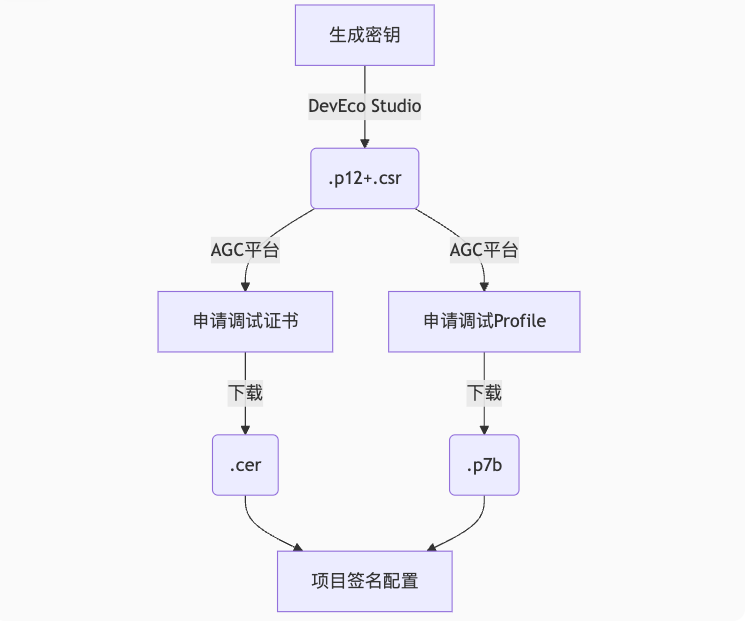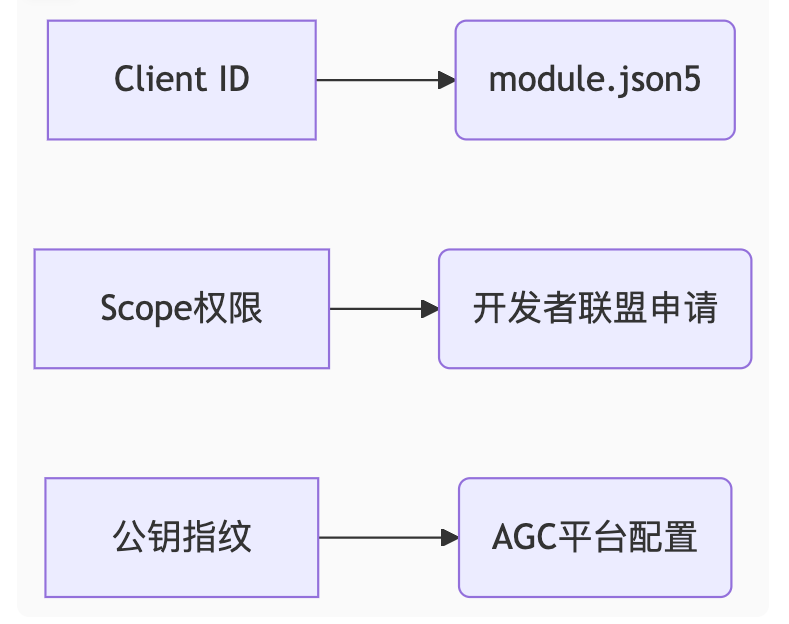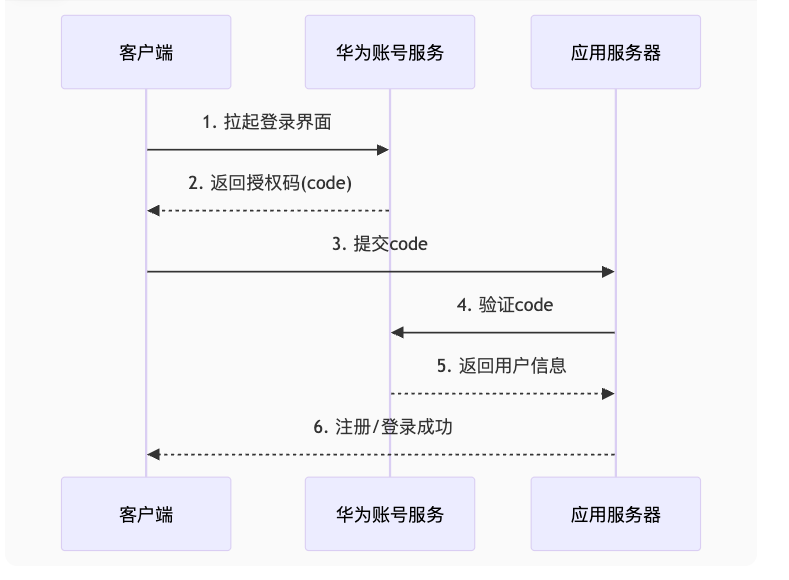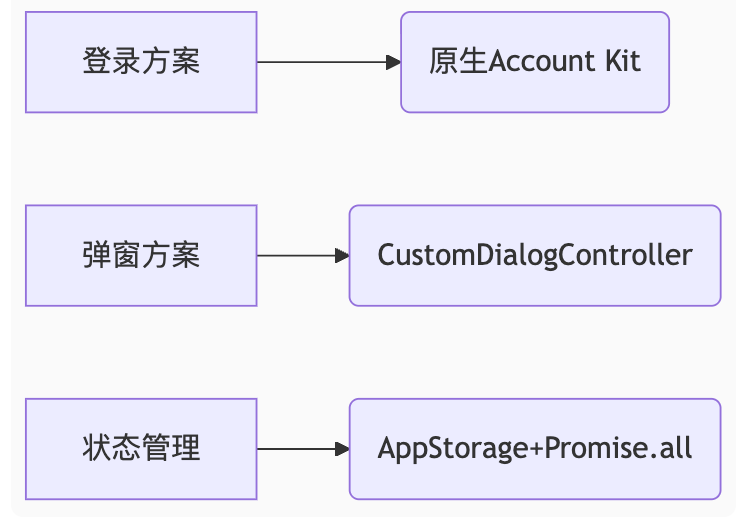HarmonyOS 鸿蒙Next中实现华为账号登录(Account Kit)集成功能的详细步骤。
HarmonyOS 鸿蒙Next中实现华为账号登录(Account Kit)集成功能的详细步骤。
一、开发准备全流程
1. 证书配置四步法

2. 关键配置项
| 文件类型 | 作用 | 获取方式 |
|---|---|---|
| .p12 | 私钥文件 | DevEco Studio生成 |
| .csr | 证书请求文件 | DevEco Studio生成 |
| .cer | 调试证书 | AGC平台申请 |
| .p7b | Profile文件 | AGC平台申请 |
签名配置示例:
// build-profile.json5
"signingConfigs": [
{
"name": "release",
"material": {
"storeFile": "meikou.p12",
"storePassword": "******",
"keyAlias": "meikou",
"keyPassword": "******",
"signAlg": "SHA256withECDSA",
"profile": "meikou_debug.p7b",
"certpath": "meikou.cer"
}
}
]
二、权限配置核心要点
1. 权限层级结构

2. 敏感权限申请流程
- 登录开发者联盟
- 进入
管理中心 > API服务 > 授权管理 - 选择目标应用
- 服务选择“华为帐号服务”
- 申请
PHONE权限(获取手机号)
三、华为登录实现精要
1. 授权登录流程图

2. 核心代码实现
封装登录模块
// features/account/src/main/ets/service/HuaweiAuthService.ets
import { AccountAuthService, AccountAuthParams, AccountAuthScope } from '@ohos/account';
export class HuaweiAuth {
static async login(context: common.UIAbilityContext): Promise<string> {
const service: AccountAuthService = AccountAuthService.getService(context);
const authParams: AccountAuthParams = {
scopeList: [AccountAuthScope.SCOPE_MOBILE_NUMBER]
};
try {
const result = await service.signIn(authParams);
return result.authCode; // 获取授权码
} catch (error) {
throw new Error(`华为登录失败: ${error.code}`);
}
}
static async logout(): Promise<void> {
const service = AccountAuthService.getService();
await service.cancelAuth();
}
}
登录页面整合
// features/auth/src/main/ets/view/LoginView.ets
import { HuaweiAuth } from '../service/HuaweiAuthService';
@Entry
@Component
struct LoginPage {
@State isLoading: boolean = false;
async huaweiLogin() {
this.isLoading = true;
try {
const code = await HuaweiAuth.login(getContext(this));
// 提交code到应用服务器
const userInfo = await AuthAPI.loginWithHuawei(code);
AppStorage.setOrCreate('user', userInfo);
} catch (error) {
promptAction.showToast({ message: error.message });
} finally {
this.isLoading = false;
}
}
build() {
Column() {
Button('华为账号登录')
.onClick(() => this.huaweiLogin())
.enabled(!this.isLoading)
if (this.isLoading) {
LoadingProgress()
.color(Color.Blue)
}
}
}
}
四、全局弹窗最佳实践
1. 官方推荐方案(API 10+)
// common/src/main/ets/component/LoadingDialog.ets
import { UIContext } from '@ohos.arkui.UIContext';
@CustomDialog
struct GlobalLoading {
@State message: string = '处理中...'
controller: CustomDialogController
build() {
Column() {
LoadingProgress()
.width(50).height(50)
Text(this.message)
.margin({ top: 10 })
}
.padding(20)
}
}
// 全局弹窗管理器
export class DialogUtils {
static showLoading(message: string = '') {
const controller: CustomDialogController = new CustomDialogController({
builder: GlobalLoading({ message }),
alignment: DialogAlignment.Center,
customStyle: true
});
controller.open();
return controller;
}
}
2. 使用示例
// 登录流程优化
async huaweiLogin() {
const controller = DialogUtils.showLoading('华为登录中');
try {
const code = await HuaweiAuth.login(getContext(this));
// ...后续处理
} catch (error) {
// 错误处理
} finally {
controller.close();
}
}
五、登出逻辑强化
// features/user/src/main/ets/view/SettingView.ets
async logout() {
try {
// 同步执行本地登出和华为登出
await Promise.all([
AuthService.localLogout(),
HuaweiAuth.logout()
]);
router.clear();
router.pushUrl({ url: 'pages/Login' });
} catch (error) {
promptAction.showToast({ message: '登出失败' });
}
}
六、常见问题解决方案
| 问题现象 | 原因 | 解决方案 |
|---|---|---|
错误码 6003 |
未配置Client ID | 检查module.json5的metaData配置 |
| 权限申请失败 | 企业资质问题 | 1. 完善申请材料 2. 使用测试账号 |
| 真机调试失败 | Profile未包含设备 | 1. 重新申请Profile 2. 添加测试设备UDID |
| 弹窗不显示 | 上下文错误 | 使用getContext获取正确上下文 |
七、安全增强措施
- Code有效期:授权码10分钟内有效,需快速提交服务器
- 防重放攻击:服务器端验证code使用状态
- 敏感信息保护:
// 加密存储token
import { cryptoFramework } from '@ohos.security.cryptoFramework';
async function secureStore(token: string) {
const cipher = await cryptoFramework.createCipher('AES256|ECB');
// ...加密操作
}
八、面试要点总结
-
封装组件经验:
- 华为登录模块:封装认证逻辑与UI解耦
- 全局弹窗:基于CustomDialogController实现
- 安全存储:结合cryptoFramework加密敏感数据
-
关键技术选择:

- 性能优化:
- 并行操作:登出时同步执行本地和云端登出
- 资源复用:DialogController单例管理
- 错误边界:try/catch包裹异步操作
更多关于HarmonyOS 鸿蒙Next中实现华为账号登录(Account Kit)集成功能的详细步骤。的实战教程也可以访问 https://www.itying.com/category-93-b0.html
3 回复
学习打卡
更多关于HarmonyOS 鸿蒙Next中实现华为账号登录(Account Kit)集成功能的详细步骤。的实战系列教程也可以访问 https://www.itying.com/category-93-b0.html
鸿蒙Next集成华为账号登录(Account Kit)步骤如下:
- 在AppGallery Connect中创建项目并启用Account Kit
- 配置应用签名指纹
- 在工程级build.gradle添加华为maven仓库
- 在模块级build.gradle添加account-kit依赖
- 在config.json中声明所需权限
- 初始化AccountAuthService
- 调用signIn接口获取AuthAccount对象
- 处理授权回调结果
关键代码片段:
const accountAuthService = account.createAccountAuthService();
accountAuthService.signIn()
.then(authAccount => { /* 处理成功 */ })
.catch(err => { /* 处理失败 */ });
在HarmonyOS Next中集成华为账号登录(Account Kit)的主要步骤如下:
- 开发准备:
- 在AGC平台创建项目和应用
- 配置签名证书(.p12, .cer, .p7b等)
- 在build-profile.json5中配置签名信息
- 权限配置:
- 在module.json5中添加必要权限:
"requestPermissions": [
{
"name": "ohos.permission.ACCOUNT_MANAGER"
}
]
- 代码实现:
- 初始化AccountAuthService:
const service = AccountAuthService.getService(context);
- 配置登录参数:
const authParams: AccountAuthParams = {
scopeList: [AccountAuthScope.SCOPE_PROFILE]
};
- 调用登录方法:
try {
const result = await service.signIn(authParams);
const authCode = result.authCode; // 获取授权码
// 将authCode发送到应用服务器换取accessToken
} catch (error) {
console.error(`登录失败: ${error.code}`);
}
- 登出实现:
await service.cancelAuth();
- 注意事项:
- 确保应用已正确配置Client ID
- 授权码(authCode)有效期为10分钟,需及时处理
- 真机调试需确保设备UDID已添加到Profile中
常见问题处理:
- 错误码6003:检查Client ID配置
- 权限申请失败:检查企业资质或使用测试账号
- 弹窗不显示:确保使用正确的UIAbilityContext
以上是HarmonyOS Next中集成华为账号登录的核心流程和关键代码实现。






